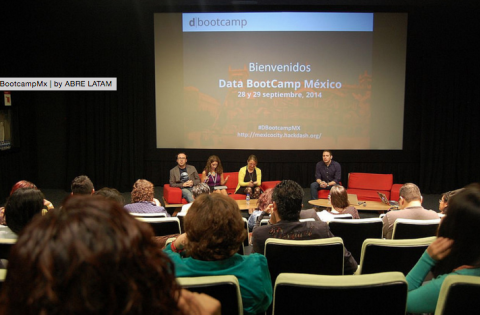
Open data is useless if nobody knows what to do with it, which is why Code for Africa's data bootcamps are so important.
Developed in 2012 by ICFJ Knight Fellow Justin Arenstein and the World Bank Institute, these data bootcamps have been held all over the world — including 10 African countries, Pakistan and Uruguay — providing journalists and developers with intensive, hands-on digital training.
But, what are these data bootcamps? And why are they so significant? To find out, IJNet caught up with Code for Africa's developer advocate, Serah Njambi-Rono.
What is a data bootcamp?
During each bootcamp, 60 to 80 journalists, developers and data specialists work in multidisciplinary teams to develop prototypes for data-driven news tools. With the help of expert mentors and trainers, each team is taught data literacy skills, such as data scraping and analysis, allowing journalists to better understand stories that exist in the data.
The top projects, typically rough prototypes, are awarded a spot in Code for Africa's Aftercare Program, which provides a small cash prize, additional mentorship and technical support aimed at turning the three-day prototypes into publicly launched products.
The winning tools demonstrate the value of collaboration between journalists and developers and provide impressive results. Take, for example, Honor Crimes, one of the winning projects prototyped at the May 2015 Karachi Bootcamp, which uses open-sourced data to visualize honor crimes in Pakistan.
Why are data bootcamps important?
Data bootcamps teach developers and journalists how to make open data accessible and applicable to citizens, which in turn enhances civic engagement and helps to hold governments accountable.
For example, Where My Money Dey?, a tool built at the 2012 Ghana Data Bootcamp, uses official government data to track the royalties mining companies are required to pay to the public. By repackaging data in a more accessible format, citizens are more equipped to hold the government and companies accountable for these payments.
What's the goal of a data bootcamp?
The aim is not only to bridge the divide between journalists and developers, but to also equip them with digital literacy skills so they can build more meaningful tools and tell more concrete stories with data. The bootcamps demonstrate that data is a powerful tool and a resource for both journalists and developers to draw on.
Bootcamps also encourage South-South collaboration, meaning projects developed in one country in the global South can be adapted to another country in the same region, allowing for the fine tuning and further dissemination of tools. For example, Got To Vote, a tool aimed at helping citizens register and locate voting centers in Kenya, was adapted for Ghana, Uganda, Malawi and Zimbabwe.
Data bootcamps have produced countless tools using open data, empowered thousands of journalists and developers with computational skills, and encouraged an active citizenry.
If you are interested in hosting a data bootcamp in your city, Njambi-Rono encourages you to reach out to Code for Africa. Keep your eye out for a Code for Africa public wiki that will provide all of the resources needed to run a data bootcamp.
Here, she elaborates on the importance of data bootcamps:
This post is also published on IJNet which is produced by ICFJ.
Image CC-licensed on Flickr via ABRE LATAM.